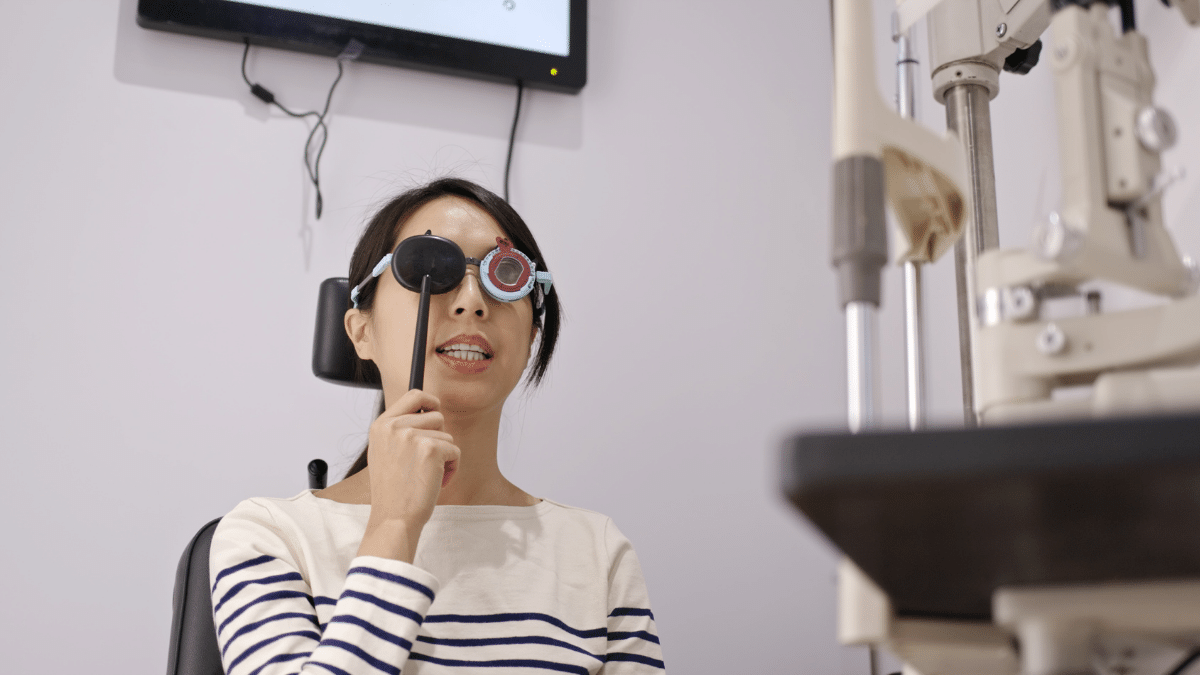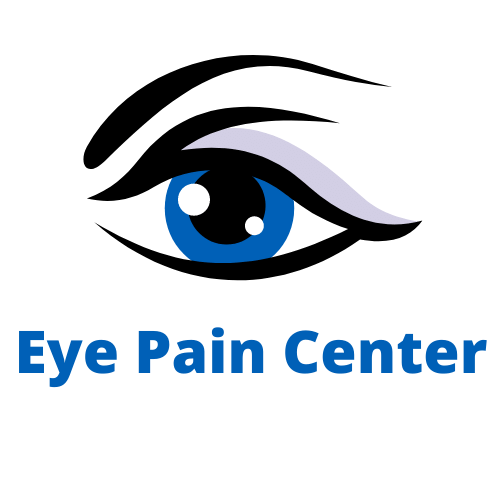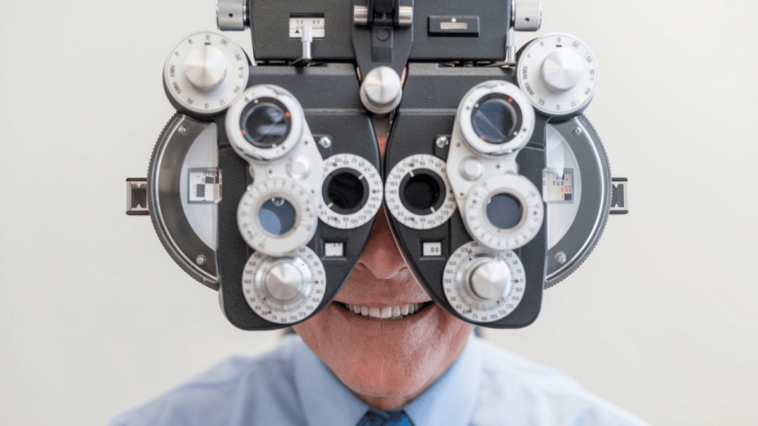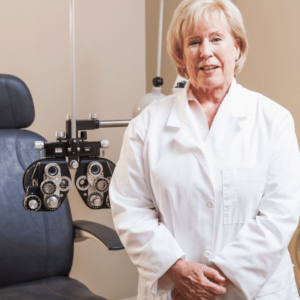What Type of Eye Exam do You Need?
Several eye exams may be recommended depending on your needs and risk factors for eye disease. Some common types of eye exams include:
Comprehensive Eye Exam
A Comprehensive Eye Exam gives an overview of your current vision and eye health. It involves a series of tests designed to measure visual acuity, assess muscle movement, and evaluate the overall health of your eyes. This eye exam is essential for identifying any existing or emerging issues that may need to be addressed to maintain optimal vision and overall eye health.
Dilated Eye Exam
Regular dilated eye exams are crucial to maintaining good vision! It is an essential procedure used to assess the eyes’ health. It involves using special eye drops that widen the eye pupil, helping the eye doctor get a better view of what’s happening inside your eyes. This allows them to check for any signs of eye disease or damage.
Glaucoma Test
A glaucoma test measures the intraocular pressure (IOP) in your eye, indicating glaucoma. This test is usually conducted by an optometrist or ophthalmologist who will use specialized equipment to measure the tension in your eye. If these measurements show elevated levels, it may be a sign that you need further testing and potential treatment for glaucoma.
Retinal Exam
A retinal exam is a medical test used to examine and assess the health of the eye’s retina. During this exam, the eye doctor checks for any abnormalities or damage to the retina, which can be caused by diabetes and other diseases. This test helps to detect potential problems and ensures that no significant harm is done to one’s vision.
Visual Field Test
A Visual Field Test is a diagnostic procedure used to identify blind spots within an individual’s field of vision. The Visual Field Test requires the patient to look into a specialized machine and identify lights that appear randomly throughout the projected visual space. This test can be useful for diagnosing diseases, such as glaucoma, which can cause partial vision loss or total blindness in a person’s peripheral field of vision.
It is recommended to have a comprehensive eye exam at least every 2 years for adults or more frequently if you have a history of eye disease or other risk factors.
How Much Does an Eye Exam Cost?

An eye exam is an essential part of maintaining good vision and overall eye health. The cost of an eye exam can vary depending on a number of factors, such as the type of exam, the location of the practice, and whether or not you have insurance.
Without insurance, the average cost of a comprehensive eye exam can range from $50 to $250. This type of exam typically includes a vision test, a check of your eye’s health, and a prescription for glasses or contact lenses if needed.
If you have insurance, your out-of-pocket cost for an eye exam may be lower. Many insurance plans cover the cost of an annual eye exam, and some even cover the cost of glasses or contact lenses. It’s best to check with your insurance provider to find out precisely what is covered under your plan.
If you don’t have insurance, there are a few options to help lower the cost of an eye exam. Many retail stores, such as Walmart, Target, and LensCrafters, offer low-cost eye exams. Additionally, some optical chains offer special discounts or promotions for people without insurance.
In summary, the cost of an eye exam can vary greatly depending on a number of factors, but generally, it ranges from $50 to $250 without insurance. It is always a good idea to check with your insurance provider or the eye doctor’s office to find out the specific cost of an exam in your area.
Learn About Insurance and Discounts
Many insurance plans cover the cost of eye exams and prescription glasses or contact lenses. Some insurance plans may also cover certain types of eye exams, such as dilated eye exams or retinal exams, but not others. It’s a good idea to check with your insurance provider to see what is covered under your plan.
Some optometrists or opticians may offer discounts for cash payments, and others may offer discounts for multiple pairs of glasses or contact lenses. There are also discounts available for eye exams and glasses or contact lenses. Additionally, some retail stores and online retailers offer discounts for bulk purchases of glasses or contact lenses.
Some non-profit organizations and charities also provide free or low-cost eye care services for individuals who cannot afford them. You can check with your local health department or non-profit organizations to see if any programs are available in your area.
It’s also worth checking if your employer offers any vision insurance as a part of their benefits package. Often, the employer will pay for a portion of the cost of an exam or glasses, so it is worth checking to see if this is an option for you.
Overall, checking with your insurance provider, employer, and local non-profit organizations or charities can help you find discounts and coverage for eye exams, glasses, or contact lenses.
Consider Different Types of Vision Centers
Several vision centers provide eye care services with unique features and offerings. Some common types of vision centers include:
- Optometrist: An optometrist is a doctor of optometry who can provide comprehensive eye exams, diagnose and treat eye diseases, and prescribe glasses and contact lenses. They are also trained to detect certain systemic diseases that may show eye symptoms.
- Ophthalmologist: An ophthalmologist is a medical doctor specializing in diagnosing, treating, and managing eye diseases and injuries. They can perform eye surgery and provide comprehensive eye exams.
- Optician: An optician is a professional who is trained to fill prescriptions for glasses and contact lenses. They can also adjust and repair glasses and provide primary eye care services.
- Retail Optical Stores: These stores offer a wide selection of frames and contact lenses, and some of them have an optometrist or ophthalmologist on staff to provide comprehensive eye exams.
- Online Retailers: Online retailers offer a wide range of eyeglasses, contact lenses, and sunglasses. Some online retailers also have a virtual try-on feature where you can try the glasses on a virtual model before buying.
- Vision insurance providers: Many insurance providers have their network of an optometrist, ophthalmologists, and retail optical stores that members can access to get their eye care services.
It’s essential to consider your specific needs when choosing a vision center. An ophthalmologist might be the best choice if you have a complex eye condition. An optometrist would be sufficient if you are looking for a routine eye exam. A retail optical store or online retailer may be a good choice if you are looking for a new pair of glasses or contact lenses.
Factor in Extras Costs
When considering the cost of eye care services, it’s essential to factor in any additional costs that may be incurred.
Some expected extra costs to consider include the following:
- Eye exam fees: A comprehensive eye exam can cost anywhere from $50 to $150 or more, depending on the location and type of provider. Some insurance plans may cover the cost of an eye exam, but you may be responsible for a co-pay or deductible.
- Glasses or contact lenses: The cost of glasses or contact lenses can vary widely, depending on the type of lens, frame, and any additional features (such as progressive lenses or polarized lenses).
- Prescription drugs: If you are prescribed eye drops or other medications, these will add to the cost.
- Additional testing: Some vision centers may charge extra for dilation, retinal scans, or visual field tests.
- Follow-up visits: If you are being treated for an eye condition, you may need to schedule follow-up visits with your eye doctor, which can also add to the cost.
- Additional services: Many vision centers offer services such as frame repairs, lens cleaning, adjustments, etc.
It’s important to factor in these additional costs when budgeting for eye care services. In addition, you should also inquire about any discounts or financing options that may be available to help you manage the costs.
Tips to Save Money on Your Exam
Here are some tips to help you save money on your eye exam:
- Check your insurance coverage: Many insurance plans cover the cost of an eye exam, so check with your provider to see what is covered under your plan.
- Compare prices: Prices for eye exams vary widely, so it’s a good idea to shop around and compare prices from different providers before scheduling your exam.
- Look for discounts: Many vision centers offer discounts for cash payments, multiple pairs of glasses or contact lenses, or bulk purchases.
- Use your vision insurance: If you have vision insurance, be sure to use it to help offset the cost of your exam.
- Please take advantage of free or low-cost programs: Some non-profit organizations and charities offer free or low-cost eye care services for individuals who cannot afford them.
- Schedule your exam during a sale: Many optical stores have sales or discounts on eye exams during certain times of the year.
- Avoid unnecessary testing: Some testing may not be necessary for your specific condition; ask your eye doctor if you are in doubt.
- Ask about financing options: If you don’t have insurance or can’t afford to pay for the exam upfront, inquire about financing options or payment plans that may be available.
- Consider online retailers: Online retailers offer a wide range of eyeglasses, contact lenses, and sunglasses at a lower cost than in-store.
Following these tips can save money on your eye exam and ensure you receive the eye care services you need.
When Should I Schedule An Annual Eye Exam?
It is recommended that adults schedule an annual eye exam, usually once a year. However, some factors may require more frequent exams, such as age, family history of eye disease, or if you have existing eye conditions.
If you are under 60 and have no risk factors for eye disease, it is recommended to have an eye exam every 2-4 years. For adults between 60-64, it’s suggested to have an exam every 1-2 years. Once you reach the age of 65 or older, it is recommended to have an eye exam annually or as advised by your eye doctor.
Additionally, if you have a family history of eye disease or if you have a pre-existing medical condition such as diabetes, high blood pressure, or autoimmune disorders, it is essential to schedule regular eye exams as per the advice of your doctor.
It’s also important to schedule an appointment immediately if you see any changes in your vision, such as blurriness, double vision, or difficulty seeing at night. These symptoms can be caused by a wide range of eye conditions, some of which can be serious if left untreated.
In summary, schedule an annual eye exam as per your doctor’s advice, and if you notice any changes in your vision, schedule an appointment immediately. Regular eye exams are essential in maintaining good eye health and keeping your vision sharp.






